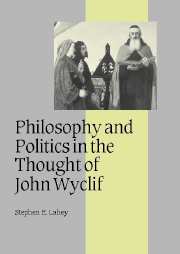Book contents
- Frontmatter
- Contents
- Acknowledgements
- Abbreviations
- 1 The historiography of Wyclif's dominium thought
- 2 Why dominium?
- 3 Wyclif's realism and divine dominium
- 4 Proprietas in Wyclif's theory of dominium
- 5 Iurisdictio in civil dominium
- 6 On kingship
- 7 Conclusion
- Bibliography
- Index
- Cambridge Studies in Medieval Life and Thought Fourth series
4 - Proprietas in Wyclif's theory of dominium
Published online by Cambridge University Press: 30 July 2009
- Frontmatter
- Contents
- Acknowledgements
- Abbreviations
- 1 The historiography of Wyclif's dominium thought
- 2 Why dominium?
- 3 Wyclif's realism and divine dominium
- 4 Proprietas in Wyclif's theory of dominium
- 5 Iurisdictio in civil dominium
- 6 On kingship
- 7 Conclusion
- Bibliography
- Index
- Cambridge Studies in Medieval Life and Thought Fourth series
Summary
De Civili Dominio is the largest of the treatises of the Summa Theologie, as well the most significant, for it introduces most of Wyclif's later theological recommendations for ecclesiastical reform. Wyclif wrote De Civili Dominio in late 1375 through 1376, directly upon completing De Divino Dominio, and even the most fleeting acquaintance with the earlier works shows the thematic ties between first works of the Summa and De Civili Dominio. Having explained the nature of God's perfect dominium, a continuing, unmediated relation between Creator and Creation, Wyclif was ready to address the earthly species of lordship and its two chief characteristics, proprietas and iurisdictio. Not surprisingly, given the significance of giving, receiving, and lending to dominium in De Dominio Divino, private property-ownership lies at the center of the arguments in De Civili Dominio and De Officio Regis. So before approaching the recognizably jurisdictive, governance-related aspects of his thought, we should address Wyclif's discussion of postlapsarian ownership.
We cannot begin as Wyclif begins, for he plunges us into matters with minimal introduction. Dominium's necessary ties to God's Grace are the subject of much of the first book, while the second and third are devoted to dominium's political and ecclesiastical ramifications. A better introductory approach is to see why Grace-founded dominium seemed so radical an idea to Wyclif's contemporaries.
- Type
- Chapter
- Information
- Philosophy and Politics in the Thought of John Wyclif , pp. 108 - 146Publisher: Cambridge University PressPrint publication year: 2003



